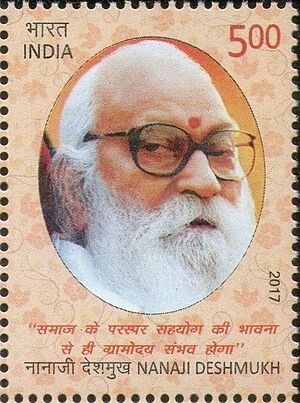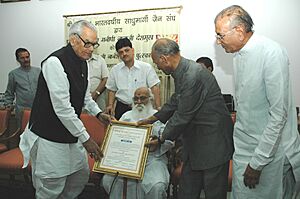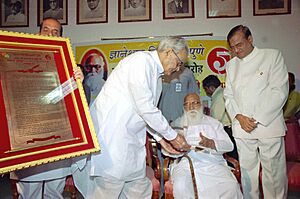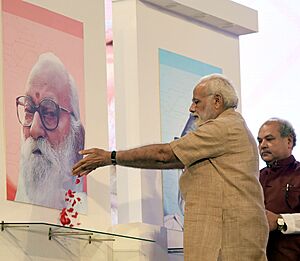Nanaji Deshmukh facts for kids
Quick facts for kids
Bharat Ratna
Rashtra Rishi Nanaji Deshmukh
|
|
|---|---|

Deshmukh on a 2017 stamp of India
|
|
| Member of Parliament, Lok Sabha | |
| In office 1977–1979 |
|
| Preceded by | Chandra Bhal Mani Tiwari |
| Succeeded by | Chandra Bhal Mani Tiwari |
| Constituency | Balrampur, Uttar Pradesh |
| Member of Parliament, Rajya Sabha | |
| In office 22 November 1999 – 21 November 2005 |
|
| Constituency | Nominated |
| Personal details | |
| Born |
Chandikadas Amritrao Deshmukh
11 October 1916 Kadoli, Parbhani District, Hyderabad State, British India (present-day Kadoli, Hingoli District, Maharashtra, India) |
| Died | 27 February 2010 (aged 93) Chitrakoot, Satna District, Madhya Pradesh, India |
| Political party | Bharatiya Jana Sangh |
| Alma mater | BITS Pilani |
| Awards | |
Chandikadas Amritrao Deshmukh, known as Nanaji Deshmukh (born 11 October 1916 – died 27 February 2010), was an important social worker and politician from India. He focused on improving education, health, and helping villages become self-sufficient.
In 2019, he was given the Bharat Ratna, which is India's highest award for civilians. He was also a leader of the Bharatiya Jana Sangh political party and a member of the Rajya Sabha, one of India's two houses of Parliament.
Contents
Early Life and Education
Nanaji Deshmukh was born on 11 October 1916. His family lived in Kadoli, a small town in Maharashtra, India. To pay for his schooling, he worked by selling vegetables.
He attended high school in Sikar, where he received a scholarship. He later studied at Birla College in Pilani. In the same year, he joined the Rashtriya Swayamsevak Sangh (RSS). The RSS is a large volunteer organization in India.
Even though he was born in Maharashtra, Nanaji Deshmukh mainly worked in Rajasthan and Uttar Pradesh. The leader of the RSS, M. S. Golwalkar, sent him to Gorakhpur in Uttar Pradesh. There, he worked as a "pracharak," which means a full-time volunteer. He eventually became a senior leader for the RSS in Uttar Pradesh.
His Work as an RSS Volunteer

Nanaji Deshmukh was inspired by leaders like Bal Gangadhar Tilak. He was very interested in helping society. His family knew Keshav Baliram Hedgewar, who founded the RSS. Hedgewar saw Nanaji's potential and encouraged him to join RSS activities.
In 1940, after Hedgewar passed away, Nanaji Deshmukh decided to dedicate his life to serving the nation through the RSS. He was sent to Uttar Pradesh as a pracharak. In Agra, he met Deen Dayal Upadhyaya, another important leader. Nanaji then went to Gorakhpur to spread the ideas of the RSS.
He worked hard, and within three years, about 250 RSS groups started in Gorakhpur. In 1950, he also opened India's first Saraswati Shishu Mandir in Gorakhpur. These are schools that focus on Indian culture and values.
In 1947, the RSS decided to start two magazines and a newspaper. Nanaji Deshmukh became the managing director for these publications. When the RSS was temporarily banned, Nanaji played a key role in continuing their publication work secretly.
Political Contributions
When the ban on the RSS was lifted, the Bharatiya Jana Sangh political party was formed. Nanaji Deshmukh was asked to lead the party in Uttar Pradesh as its general secretary.
His hard work helped the Bharatiya Jana Sangh grow strong at the local level. By 1957, the party had groups in every district of Uttar Pradesh. Nanaji traveled widely and worked very hard to achieve this.
He also built strong relationships with other political leaders, like Dr. Ram Manohar Lohia. This helped the Bharatiya Jana Sangh work with other parties. Their efforts led to the first non-Congress government in Uttar Pradesh in 1967.
Nanaji Deshmukh also took part in the Bhoodan Movement. This movement, started by Vinoba Bhave, encouraged rich landowners to donate land to the poor. Later, when Jayaprakash Narayan called for a "Total Revolution" to improve society, Nanaji fully supported it.
After the Emergency period in India, Nanaji Deshmukh won the 1977 election from Balrampur. He became a member of the Lok Sabha, which is the lower house of India's Parliament. He was even offered a position as a minister in the government, but he chose not to accept it.
In 1999, he was nominated to the Rajya Sabha, the upper house of Parliament. This was to recognize his many services to the nation.
Social Work and Rural Development

After leaving active politics, Nanaji Deshmukh focused on social work. He dedicated his time to the Deendayal Research Institute, which he had founded in 1969.
He worked on programs to fight poverty and meet basic needs in villages. His projects also focused on agriculture, small-scale industries, rural health, and education. He led a social improvement program in over 500 villages in Uttar Pradesh and Madhya Pradesh.
Nanaji Deshmukh did important social work in areas like Gonda and Balrampur in Uttar Pradesh, and Beed in Maharashtra. His project's goal was: "Every hand will get work, every field will get water."
He also started the Mahatma Gandhi Chitrakoot Gramoday Vishwavidyalaya in Chitrakoot. This was India's first university focused on rural development. As its Chancellor, Nanaji used his ideas to improve the lives of people in more than 150 villages in the Bundelkhand region.
Awards and Recognition
Nanaji Deshmukh received India's highest civilian award, the Bharat Ratna, in 2019 (after his death). He was also awarded the Padma Vibhushan, India's second-highest civilian award, in 1999.
Death
Nanaji Deshmukh passed away on 27 February 2010. He died at the Chitrakoot Gramoday Vishwavidyalaya, the university he founded. He had been unwell for some time due to old age. He chose not to go to Delhi for treatment. He donated his body for medical research, which was accepted.
See also
- Vidya Bharati
- Indian Nationalism
- Deen Dayal Upadhyaya
- Vinayak Damodar Savarkar
- Lal Krishna Advani
- Balraj Madhok
- Rashtriya Swayamsevak Sangh
 | Delilah Pierce |
 | Gordon Parks |
 | Augusta Savage |
 | Charles Ethan Porter |


